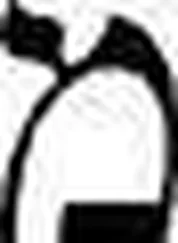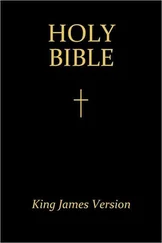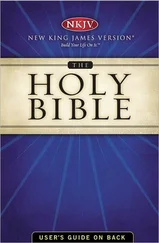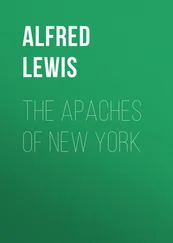And as its beams shot across the land the travelers could see for the first time what sort of place they were in. It was a valley through which a broad, swift river wound its way, flowing eastward toward the sun. Southward there were mountains, northward there were lower hills. But it was a valley of mere earth, rock and water; there was not a tree, not a bush, not a blade of grass to be seen. The earth was of many colors; they were fresh, hot and vivid. They made you feel excited; until you saw the Singer himself, and then you forgot everything else.
—from The Magician’s Nephew
For reflection Genesis 1:1–19
26 Then God said, “Let us make humankind[ 3] in our image, according to our likeness; and let them have dominion over the fish of the sea, and over the birds of the air, and over the cattle, and over all the wild animals of the earth,[ 4] and over every creeping thing that creeps upon the earth.”
27So God created humankind[ 3] in his image,
in the image of God he created them;[ 5]
male and female he created them.
28God blessed them, and God said to them, “Be fruitful and multiply, and fill the earth and subdue it; and have dominion over the fish of the sea and over the birds of the air and over every living thing that moves upon the earth.” 29God said, “See, I have given you every plant yielding seed that is upon the face of all the earth, and every tree with seed in its fruit; you shall have them for food. 30And to every beast of the earth, and to every bird of the air, and to everything that creeps on the earth, everything that has the breath of life, I have given every green plant for food.” And it was so. 31God saw everything that he had made, and indeed, it was very good. And there was evening and there was morning, the sixth day.
2 Thus the heavens and the earth were finished, and all their multitude. 2And on the seventh day God finished the work that he had done, and he rested on the seventh day from all the work that he had done. 3So God blessed the seventh day and hallowed it, because on it God rested from all the work that he had done in creation.
For reflection: Genesis 2:3
I don’t believe that good work is ever done in a hurry.
—from a letter to Arthur Greeves, July 11, 1916
There is hidden or flaunted, a sword between the sexes till an entire marriage reconciles them. It is arrogance in us to call frankness, fairness, and chivalry “masculine” when we see them in a woman; it is arrogance in them to describe a man’s sensitiveness or tact or tenderness as “feminine.” But also what poor, warped fragments of humanity most mere men and mere women must be to make the implications of that arrogance plausible. Marriage heals this. Jointly the two become fully human. “In the image of God created He them .” Thus, by a paradox, this carnival of sexuality leads us out beyond our sexes.
—from A Grief Observed
For reflection Genesis 1:27
Creation seems to be delegation through and through. He will do nothing simply of Himself which can be done by creatures. I suppose this is because He is a giver. And He has nothing to give but Himself. And to give Himself is to do His deeds—in a sense, and on varying levels to be Himself—through the things He has made.
—from Letters to Malcolm: Chiefly on Prayer
For reflection  Genesis 2:19
Genesis 2:19
4 These are the generations of the heavens and the earth when they were created.
In the day that the LORD[ 6] God made the earth and the heavens, 5when no plant of the field was yet in the earth and no herb of the field had yet sprung up—for the LORD God had not caused it to rain upon the earth, and there was no one to till the ground; 6but a stream would rise from the earth, and water the whole face of the ground— 7then the LORD God formed man from the dust of the ground,[ 7] and breathed into his nostrils the breath of life; and the man became a living being. 8And the LORD God planted a garden in Eden, in the east; and there he put the man whom he had formed. 9Out of the ground the LORD God made to grow every tree that is pleasant to the sight and good for food, the tree of life also in the midst of the garden, and the tree of the knowledge of good and evil.
10 A river flows out of Eden to water the garden, and from there it divides and becomes four branches. 11The name of the first is Pishon; it is the one that flows around the whole land of Havilah, where there is gold; 12and the gold of that land is good; bdellium and onyx stone are there. 13The name of the second river is Gihon; it is the one that flows around the whole land of Cush. 14The name of the third river is Tigris, which flows east of Assyria. And the fourth river is the Euphrates.
15 The LORD God took the man and put him in the garden of Eden to till it and keep it. 16And the LORD God commanded the man, “You may freely eat of every tree of the garden; 17but of the tree of the knowledge of good and evil you shall not eat, for in the day that you eat of it you shall die.”
18 Then the LORD God said, “It is not good that the man should be alone; I will make him a helper as his partner.” 19So out of the ground the LORD God formed every animal of the field and every bird of the air, and brought them to the man to see what he would call them; and whatever the man called every living creature, that was its name. 20The man gave names to all cattle, and to the birds of the air, and to every animal of the field; but for the man[ 8] there was not found a helper as his partner. 21So the LORD God caused a deep sleep to fall upon the man, and he slept; then he took one of his ribs and closed up its place with flesh. 22And the rib that the LORD God had taken from the man he made into a woman and brought her to the man. 23Then the man said,
“This at last is bone of my bones
and flesh of my flesh;
this one shall be called Woman,[ 9]
for out of Man [ 10] this one was taken.”
24Therefore a man leaves his father and his mother and clings to his wife, and they become one flesh. 25And the man and his wife were both naked, and were not ashamed.
3 Now the serpent was more crafty than any other wild animal that the LORD God had made. He said to the woman, “Did God say, ‘You shall not eat from any tree in the garden’?” 2The woman said to the serpent, “We may eat of the fruit of the trees in the garden; 3but God said, ‘You shall not eat of the fruit of the tree that is in the middle of the garden, nor shall you touch it, or you shall die.’” 4But the serpent said to the woman, “You will not die; 5for God knows that when you eat of it your eyes will be opened, and you will be like God,[ 11] knowing good and evil.” 6So when the woman saw that the tree was good for food, and that it was a delight to the eyes, and that the tree was to be desired to make one wise, she took of its fruit and ate; and she also gave some to her husband, who was with her, and he ate. 7Then the eyes of both were opened, and they knew that they were naked; and they sewed fig leaves together and made loincloths for themselves.
We do not know how many of these creatures God made, nor how long they continued in the Paradisal state. But sooner or later they fell. Someone or something whispered that they could become as gods—that they could cease directing their lives to their Creator and taking all their delights as uncovenanted mercies, as “accidents” (in the logical sense) which arose in the course of a life directed not to those delights but to the adoration of God. As a young man wants a regular allowance from his father which he can count on as his own, within which he makes his own plans (and rightly, for his father is after all a fellow creature), so they desired to be on their own, to take care for their own future, to plan for pleasure and for security, to have a meum from which, no doubt, they would pay some reasonable tribute to God in the way of time, attention, and love, but which, nevertheless, was theirs not His. They wanted, as we say, to “call their souls their own.” But that means to live a lie, for our souls are not, in fact, our own. They wanted some corner in the universe of which they could say to God, “This is our business, not yours.” But there is no such corner. They wanted to be nouns, but they were, and eternally must be, mere adjectives.
Читать дальше
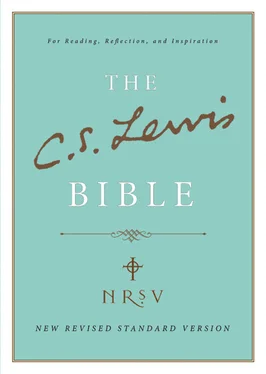
 Genesis 2:19
Genesis 2:19
